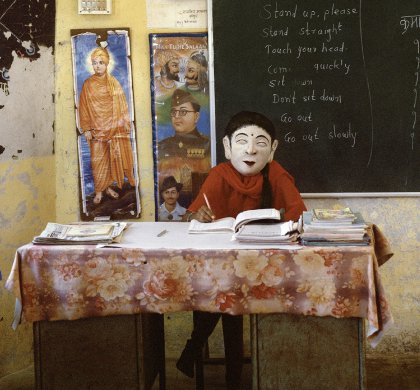
Note 46
In this September 2022 release of Out of Print that closes our twelfth year as a publishing platform, we feature eight stories. They range from those where the protagonists look inward, to ones where they are synthesised in a societal scape that informs the story and layers it varyingly with menace, humour, reflection and tragedy.
Shahadat’s ‘Halfway Companion‘, translated from Hindi by Kartikeya Jain, begins with an invitation to a wedding. Meandering through the many nuanced familial relationships that identify who and how many from the clan should attend the wedding, the reader sees the young protagonist as safe in the cradle of the family. That is, until a total strike, a chakka jam, intrudes on his journey home and he is thrown into a profoundly hostile menacing reality.
Despite the fact that Gankhu Sumnyan’s ‘The Pay Raise’ is driven by the possibility of an increase in salary for Chani baido, and the anxiety around whether it will actually be granted, the story is ultimately about that rare thing, recognising contentment. Menace lies below the surface and is only revealed in glimpses, but it is present, and the reader is aware that they will encounter it in due course unless there is a shift in the narrative.
The title of this next story, ‘Motiram Kulmetha’s Day in Court’ by Paromita Goswami, who was until recently a grassroots land and forest rights activist from Chandrapur, says it all. Highlighting how political and corporate power manipulates Adivasi communities, the story is about the appearance of Motiram Kulmetha, a representative of a twice-displaced village, in court. We learn, through his testimony, a story of their community, about the irreplaceable loss of forest and friend he has experienced.
In Shikhandin’s ‘Murga’ we encounter a corporate professional struggling with the difficulties of maintaining his situation. He meets an older gentleman whom the protagonist reads as coming from a lower social status. The latter, through his open and ingenuous demeanour, and the respect he holds in the community, manages to destabilise the former’s complacence and expose the core of his loneliness. The story is told with humour, and a seeming mockery of manner of speech that, in its consistency, only bolsters the critical intent of the narrative.
Human fallibility in different registers is exposed in Polie Sengupta’s ‘An Unfortunate Birth Star’ that forefronts the ridiculous. It is time to arrange the marriage of a young woman; but she is born under the moola nakshatram which will imply, in the words of the ornery astrologer, that ‘the moment she enters her husband’s house, her father-in-law, luckless man, will die.’ The machinations of the mother and the triumph of love result in unexpected consequences.
In this excerpt from the novel, C by Anupama Raju, titled ‘Mind the Gap’ we are given a lyrical, dystopian glimpse into a city and a world via the internal dialogue of a writer. Written in a combination of poetry and prose, we learn through the author’s note that this is a tale of two cities, and we see from the featured piece that it is reflection on reading and writing and place, and an absent lover.
In Nighat Gandhi’s ‘Normal’, a mother negotiates the delicacy of an extended conversation across continents with a daughter. It is the middle of the pandemic, and the young woman reveals she has broken up with her partner. Exchanged over WhatsApp messages and occasional conversations, the mother, conscious that she must maintain an emotional distance and not appear to interfere, reviews her situation, with searing honesty.
With ‘Repetition’ Tanuj Solanki returns to a reflection on word, concept, self and life that marked his early stories published in Out of Print. Communicating with detail and precision his daily walk to the cigarette shop, his smoke at the curb, the school en route, the behaviour of the dogs in the neighbourhood, and so on, we follow his thoughts and also the revelation of his anxieties about changes in routine, rhythm and pattern that might signal ‘a crumbling of repetition and solitude’.
The art on the cover of Out of Print 46 is by Gauri Gill.
